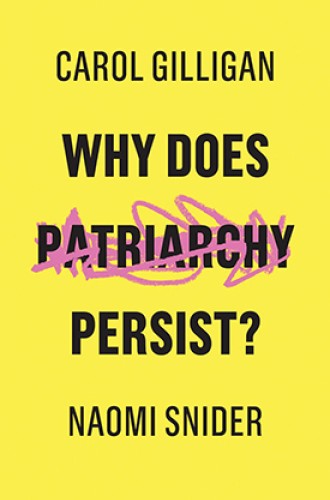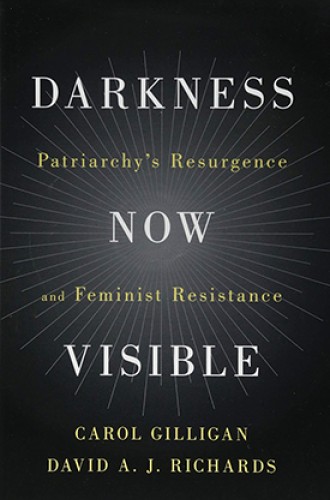In the Radical Listening Project, Carol Gilligan’s work has found its voice
The psychologist’s new project makes explicit the moral imperative that has animated her work for decades.
Carol Gilligan has been a distinctive presence in feminist discourse for a generation. She’s a psychologist, ethicist, researcher, and author who worked alongside Lawrence Kohlberg and Erik Erikson as a PhD student and then joined Harvard’s faculty. Gilligan’s first book, In a Different Voice (1982), shone a critical light on the omission of women’s experience in her colleagues’ research on human development and moral reasoning and named a “different voice” of relationality and care to which feminine experience often attests. In a Different Voice sold over 700,000 copies, was reprinted in a dozen languages, and was a significant springboard for research and writing about the lives of women.
Her work was criticized by some psychologists and feminist scholars because of its narrative methodology and seeming reiteration of binary gender stereotypes. But Gilligan’s attention to the psychology of women and girls was groundbreaking, and the descriptions of women’s experience gleaned from her interviews resonated with thousands of readers. In response to her critics, Gilligan claimed that she never intended to theorize or define experience for all women but rather to raise awareness that people do not speak with a single voice nor do we follow a single trajectory of development or a universal model of moral decision making. “I thought of the book as the opening of a conversation—certainly not the close of one,” Gilligan explained.
Read our latest issue or browse back issues.
The book and its author have fueled a wider cultural conversation about gender and moral agency. Gilligan’s interests in psychology, ethics, literature, and gender have traversed disciplinary boundaries and certainties not only in her research and writing but in her academic affiliations and her teaching as well. She was Harvard’s first professor of gender studies, she taught American history at Oxford, and she is affiliated with the humanities and the law school at New York University. Gilligan’s work transcends (and to some minds, transgresses) traditional academic languages and methods and defies simple categorization.
In 2017, Gilligan and several collaborators created the Radical Listening Project, which continues research on women’s experience. “The word ‘radical’ encompasses both the method of listening and the intention: radical in the sense of going to the root of what is being said (and not said) and radical in the sense of creating a potential for transformation,” she writes on the project’s website. Here, Gilligan’s work has found its own voice: in the project’s call for radical listening and the transformation of human relationships, she makes explicit the moral imperative that has animated her scholarship and teaching for decades.
Both of the short volumes Gilligan published in 2018—Why Does Patriarchy Persist? and Darkness Now Visible—are coauthored with colleagues and represent the work of the Radical Listening Project. Both were written in the tumultuous wake of the 2016 presidential election. Gilligan and Naomi Snider put it this way: “With the election of Donald Trump, the persistence of patriarchy has once again come to the fore as a question that calls for explanation. Why does patriarchy persist?”
In Why Does Patriarchy Persist? Gilligan and Snider push past the obvious explanation that patriarchy endures simply because some people benefit from the advantages it confers. Gilligan and Snider postulate that there must be deeper motivations that keep such an obviously outmoded social hierarchy in place.
Turning to theories of psychological resistance, they find resonance in psychologist John Bowlby’s understanding of our human response to loss. They trace their own stories and those of their students, arguing that in a patriarchal culture, becoming an “honorable man” or a “good woman” requires emotional detachment (“I don’t care”) on the part of boys and compulsive caregiving and self-denial (“I don’t know”) on the part of girls. Both adaptations, they argue, result from the underlying human fear of loss of significant relationships:
Patriarchy persists in part by forcing a loss of relationship and then rendering the loss irreparable. Without the possibility for repair, love—a force of nature that has the power to uproot patriarchy—becomes sacrificed to protect us from the pain of loss. This sacrifice of love then serves the establishment of hierarchy and opens the way to its preservation.
Reading the intransigence of patriarchal attitudes and institutions through the lens of loss and trauma offers significant dynamic insight and tangible remedy. At the same time, these theories are complicated, and their explication requires the bulk of the book—and likely more—in order to be instrumental in shifting the practicalities and politics of patriarchy.
While the book’s title does not promise results, its final chapter points readers toward an enormous task—the restoration of our human capacity for relationship through practices and pedagogies that recognize the equality of all voices.
Darkness Now Visible: Patriarchy’s Resurgence and Feminist Resistance, is a sequel to Gilligan’s 2008 collaboration with David Richards, The Deepening Darkness: Patriarchy, Resistance, and Democracy’s Future.
Richards’s particular concern is for the vitality of a democracy “that rests on a premise of equal voice as the condition for free and open conversation or debate . . . a voice that speaks from experience. For democracy to be truly a government by and for the people, everyone’s voice becomes vital.” The bulk of the book is a thick description of the Trump campaign leading up to the 2016 election.
Gilligan and Richards offer a detailed explication of how patriarchal claims replaced democratic ones, gender became “the heart of the matter,” feminist voices were silenced, and countless voters betrayed their own inner voices and interests, instinctively protecting themselves from the perceived loss of legitimacy and belonging. Through wide-ranging appeals to Greek myth, historical movements, political philosophers, and the Western literary canon, the authors argue that constructions of gender are both powerful and distressingly invisible in our cultural life and political processes. The future of American democracy, they believe, demands the recovery of a robust feminism that can expose and resist patriarchal oppression.
Why should readers of the Christian Century pay attention to the cultural interpretations of NYU professors who scarcely cite religion in their writing? Many are likely to find these two slim volumes heavy sledding, and the authors’ assumption that their readers are familiar with the entire canon of Western literature can be off-putting.
But readers will recognize themselves and their own gendered experience in the stories told and in the authors’ accounts of their own struggles to feel, to hear, and to be heard.
Gilligan’s characteristic rejection of easy explanations and popular interpretations of significant human challenges, and her willingness to hear these “different voices,” yields new language for something that pastors, therapists, and people of faith have long known but often fail to put into practice. As creatures of an all-loving and all-wise Creator, we are designed for relationship rather than for domination. We will come to no good without the vital wisdom we can derive only from one another, from those whose bodies and perspectives are different than our own. Along with Snider and Richards, Gilligan models the habits of lifelong learning, radical listening, and curious collaboration that are the sorely lacking—and desperately needed—among contemporary educators, healers, and leaders.
A version of this article appears in the print edition under the title “Voice of a matriarch."








